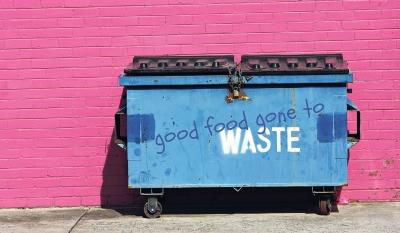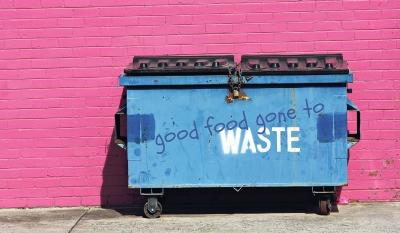
Thousands of tonnes of perishable food is being thrown away every year – not because it has gone bad but because it has reached its sell-by date or because it no longer has the fresh appearance customers are thought to demand.
Discarded supermarket food is finding its way to people who need it with the launch of a new government programme
Two years after the notorious “Muffin Man” was arrested for taking baked goods from a skip outside a supermarket in East Flanders, a programme is now taking off to put discarded food onto the tables of the needy. “Skipping”, or taking food from skips, is on the rise, too, with even a recent workshop on the subject being held in Antwerp.
Ingrid Lieten is the former chief executive of Flemish public transport authority De Lijn and now the deputy minister-president of Flanders. Jeroen Robbe is a 20-something anti-capitalist, a volunteer activist for Bond Zonder Naam (Union Without a Name) and a crusader against the consumer culture. You wouldn’t expect the two of them to have much in common, but they agree on one thing: The waste of thousands of tonnes of perfectly good food thrown away every year by supermarkets, while poor people go hungry, has to end. “In one month, we were able to reclaim €10,000 worth of food in one supermarket. That is phenomenal,” commented Lieten, the Flemish minister in charge of poverty issues, last month on the completion of a pilot project in Sint-Truiden, Limburg province. The project in her home province was “so successful,” she said, “that we are now going to see how it can be extended to the whole of Flanders.”
The pilot project began in May and involved a Delhaize supermarket and the Sint-Vincentius, or St Vincent de Paul, aid society. The charity, inspired by the news headlines in 2010 about “Muffin Man” Steven De Geynst, wanted to spearhead a programme of food collection targeting both fresh foods and packaged foods that have reached their sell-by dates. The food would be distributed to the underprivileged.
For years, the supermarket industry has worked with organisations to supply food banks by, for example, inviting shoppers to buy extra packages of non-perishables such as rice, pasta or coffee for donation to volunteers who then pass them on to the needy. Over time, however, the quantities supplied by supermarkets have decreased, while demand has risen: from 12.2 million kilograms in 2008 for 114,900 people across Flanders to 10.7 million kg for 115,800 people in 2010. At the same time, thousands of tonnes of perishable food is being thrown away every year – not because it has gone bad but because it has reached its sell-by date or because it no longer has the fresh appearance customers are thought to demand. Until now, the supermarket chains have found it impossible to organise the distribution of that sort of food – most of which is still edible. And so it has gone in the bin.
Do you know the Muffin Man?
Then along came De Geynst, arrested in March 2010 after being challenged by a GB supermarket manager as he was taking two packages of muffins from the skip in the supermarket’s parking lot in Kruibeke, East Flanders. A scuffle ensued, and De Geynst, who immediately became known in the press as the Muffin Man, was charged with theft and assault. He was convicted by a court in Dendermonde and sentenced to six months suspended for three years. De Geynst’s story struck a nerve: He had for about 10 years been a freegan, adhering to the philosophy and practice of eating food that has been thrown away. Freegans practice what is variously known as dumpster-diving (in the US) or skipping (in the UK) – in Flanders containerduiken or skippen – which involves helping themselves to what others throw away. This means not only food but furniture, clothing, electronics, etc.
His conviction brought protests but, more than that, the sudden realisation on the part of ordinary people about how much food was being sent to the landfill instead of finding its way to the tables of the poor – to children who go to school without breakfast, to elderly people who have to choose between grocery shopping and turning on the heating.
De Geynst was acquitted on appeal, Sint-Vincent de Paul in Sint-Truiden started collecting food from a local Delhaize, and Ingrid Lieten called on the federal food safety agency and the retail confederation Comeos to simplify the process of giving food to the needy rather than the skip.
“We succeeded there, too,” Lieten said. The food safety agency just published a circular effectively making the regulations more flexible. “That means the project has grown up and that we can now go for a more structural approach,” she explained. “To extend the project to the rest of Flanders, we now need more volunteers and more partners.”
Delhaize has already expressed its willingness. “Our business strategy places an emphasis on sustainable enterprise,” a spokesperson for the chain said. “We were immediately prepared to take part in this socially worthy project.” The chain plans to increase the programme to 13 of its stores here.
“Because of this project, Sint- Vincentius has been able to offer healthy and varied food to hundreds of families who were suffering,” confirms volunteer Marcel Sterck. “Not long ago one of the children from the families said to me: ‘I’m so happy with our big food packages. Now mama can have more to eat, too; she hardly dared to eat anything before or my two sisters, my brother and me would have nothing’.”
“A judicial grey area”
Jeroen Robbe comes from Ghent, but he was in Antwerp last month to give a workshop on skipping in connection with an exhibition (now finished) organised by the social activist organisation Bond Zonder Naam and the multicultural organisation KifKif.
For Robbe, enterprise has a slightly different meaning from the one intended by Delhaize. He quotes the anarchist icon Emma Goldman, born in Lithuania in 1869 and imprisoned in New York for inciting a riot in 1893 when she told the crowd: “Demonstrate before the palaces of the rich; demand work. If they do not give you work, demand bread. If they deny you both, take bread.”
Though he has been a dumpster diver himself, he’s not currently active, he says. Right now he’s more concerned with raising awareness of “the discrepancy between poverty and overproduction of food,” he says. “It’s difficult to explain how a person can be arrested for stealing food while the bankers who plundered the financial system and caused the whole economic crisis go free.”
But the workshop is concerned more with practical matters: how do you go about finding food. How can you tell if it’s safe to eat? What’s the legal situation? The question is, he says, “a judicial grey area”. De Geynst took his muffins from an open container, but many supermarkets are now electing to chain up their skips or place then in a gated enclosure. Serving yourself in that case might well be a criminal offence.
The question of food safety, says Robbe, “is a matter of common sense. Food keeps better in the winter than in the summer. That’s logical. When I was living in Iceland, the containers in the winter were as good as freezers. And fresh produce and packaged goods are likely to be safer than dairy products, for example. I’m a vegetarian, but in any case, meat is probably something to avoid. I’m not saying it’s never OK, but you should be very, very careful.”
Skipping How-to
For his workshop on skipping, Jeroen Robbe set up a typical black plastic dumpster outside the premises of the activist organisation Bond Zonder Naam and stocked it with a variety of the sort of food you’re likely to find. Robbe is joined by a young man named Jimmy, an active skipper, here to offer the benefit of his practical experience.
• Check out the site in daylight to get the lay of the land, including any obstacles, visibility and escape routes if you’re interrupted
• Wear dark clothing so as not to attract attention at night; skippers typically wear head lamps to keep both hands free. Don’t go alone, and get someone to keep a lookout. “It’s better not to get caught in the first place than to get into a discussion about the legalities”.
• Take only what you need or can use. “What might seem useless to you might be useful to the next person who comes along.”
• Check the dates on packages but use common sense. A sell-by date isn’t the same as a use-by date.
• If you’re not sure, leave it. “The idea is not to take something just so you can throw it in the bin yourself when you get home.” If you can’t use it all, share what you get with someone else who needs it.
• Check the packaging for real damage. Sometimes food is thrown away for cosmetic reasons – dented cans, or crushed boxes. “Fresh produce should of course be washed thoroughly anyway.”
• “Sometimes what’s thrown away really is waste.” Staff in some stores are instructed to destroy what’s being put outside to stop skippers – covering it with bleach or detergent, for example, to make it inedible.
• Leave the place as tidy as you found it. “The more problems you leave behind for the staff, the less likely they are to be tolerant in future.”

